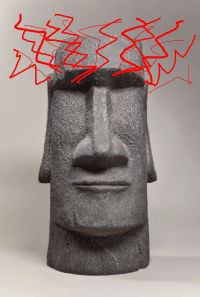Why Does My Head Actually Hurt?
In all this discussion about serotonin, diets, nerve, and weight loss, it’s easy to overlook one simple question. Why does my head actually hurt?
It’s a good question, and, not surprisingly, not easy to answer.
 |
When many people think of pain, they think in very concrete, physical terms. A nerve is being pinched. I have a needle stuck in my skin. I stubbed my toe. And therefore, I have pain.
And of course, headache pain can come from something very obvious. You hit your head on the shelf, and it hurts. Don’t do that again.
But pain from many headaches is more tricky for two reasons. First, there isn’t a visible cause. Second, there may not be a simple cause, or even a known cause.
To add to the confusion, you need to remember that your brain itself can’t feel pain.
Now let’s talk about primary headaches. Primary headaches don’t come from an obvious cause, and would include tension-type headache, migraine, and cluster headache.
Although we don’t fully understand the causes of most of these headache types, we do know a lot about what happens in the body during a headache. We know that nerves, and in particular pain-sensing cells called nociceptors, tell you that you’re in pain – or at least play a part. Somehow the brain starts communicating with these cells, and the pain cycle begins. A focus for many headaches is the nerve in the head known as the trigeminal nerve.
In their book Migraine and Other Headaches, Drs Young and Silberstein write:
It appears that the brain can spontaneously produce pain and then take it away. Some experts have even called primary headache a “reflex”. … Experts have speculated that some primary headaches may be normal pain reflexes gone awry – a human form of the fright response to threat that causes animals to become inactive – or a warning that the environment is too stressful.
After the chain reaction begins, there can be a lot of causes of pain. Leaking blood vessels, inflammation… your muscles may tense up, you may get congested… and the cycle may mean more and more pain.
For migraine and migraine headache, it seems that the brain makes the person more sensitive to pain. That means that it takes less to start and attack, and less to keep it going.
This general sensitivity may lead to more than just head pain. Face pain – and in fact pain all over the body – is not uncommon in migraine.
Why does your head hurt? In most cases, we’re not sure. That’s because, even after the giant steps forward over the past 20 years, the brain is still a mystery. However, genetics, biology and other factors seem to lead to sensitivity that starts a chain reaction that can be hard to stop.
The good news is that we can often figure out what starts an attack, and there are treatments that can slow it, stop it, or even keep it from starting in the first place.
Here’s a great introduction to pain in general, featuring a panel of experts:
